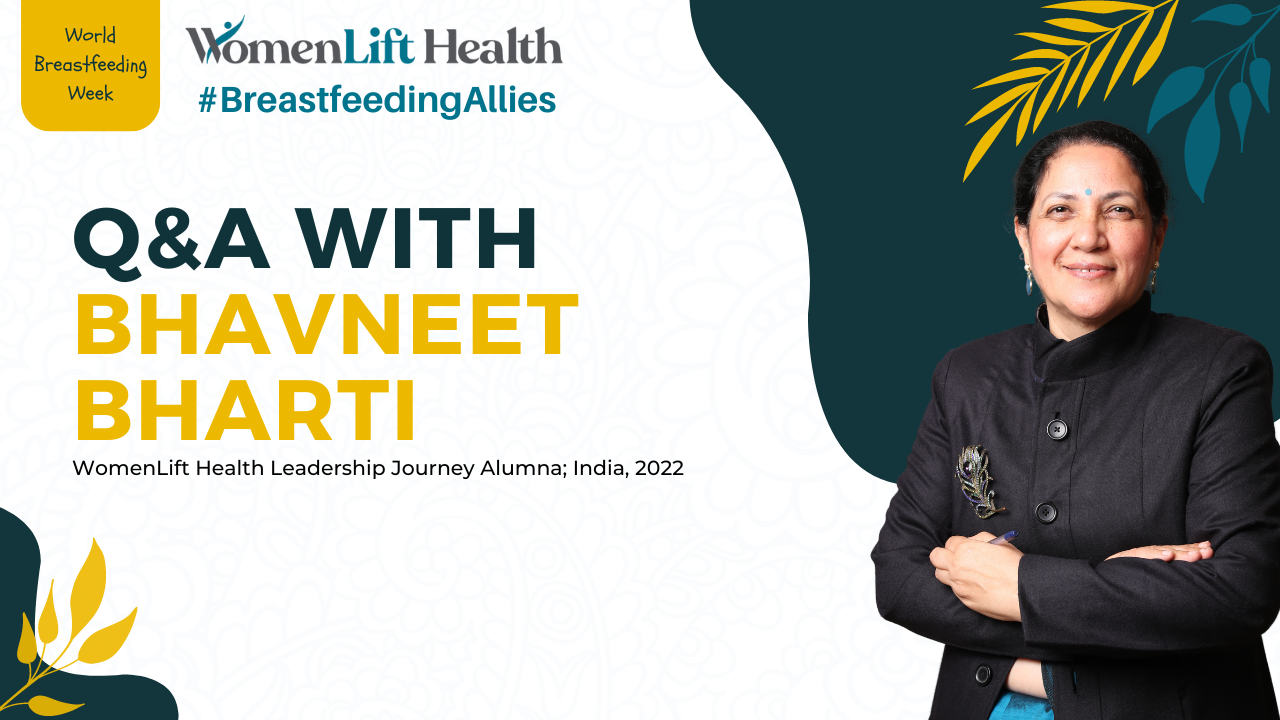For World Breastfeeding Week, we had the pleasure of speaking with Bhavneet Bharti (WomenLift Health Leadership Journey Alumna, India, ’22), a passionate advocate for creating supportive environments for breastfeeding in the workplace. Breastfeeding is crucial for early childhood development, providing holistic health benefits that extend well beyond infancy. Yet, the challenges faced by working mothers can often impede this essential practice.
Why is breastfeeding so vital for early childhood development?
Bhavneet: In the world of newborn care, one practice that emerges as a game changer is breastfeeding. Beyond being a vital source of complete nutrition, it acts as a remarkable real-time biological pharmacy, offering a continuum of protection throughout early childhood and beyond. Phrases like “the golden first hour” and “the first thousand days of life” have gained global recognition, underscoring the significance of breastfeeding for a child’s holistic health and future potential.
What is the significance of World Breastfeeding Week and how does this year’s theme address the challenges faced by working women in relation to breastfeeding?
Bhavneet: This year’s theme ‘Closing the Gap: Breastfeeding support for all’ celebrates breastfeeding mothers in all their diversity, throughout their breastfeeding journeys, while showcasing the ways families, societies, communities and health workers can support every breastfeeding mother. Breastfeeding plays a vital role in early childhood development, offering holistic health benefits that extend beyond infancy. However, the challenges faced by working mothers often hinder this essential practice.
It is surprising to note that over half a billion working women lack essential maternity protections in their national laws, and only 20% of countries mandate paid breaks and facilities for breastfeeding employees. Moreover, globally, less than half of infants under six months old receive exclusive breastfeeding and in India, only 64% children were breastfed as reported in the National Family Health Survey – 5 released in 2021. However, there are positive strides in countries like India, where the public sector provides paid maternity leave and benefits through the Maternity Benefit Amendment Act 2017, fostering a culture of support for breastfeeding.
What are some of the challenges faced by working mothers in developing countries regarding breastfeeding, and how can a Baby Friendly Office Initiative (BFOI) help address them?
In developing countries, the limitation or failure to breastfeed is at least partially due to prevailing social norms, which affect breastfeeding goals despite the availability of guideline-compliant healthcare services. For working mothers, a personalized approach tailored to their family and social support, distance between their home and office, the nature of their work, and the needs of the baby are of critical importance. At the six-month mark, it is possible for mothers to express milk and store it at home for others to feed the baby. However, getting paid time off for breastfeeding in low- and middle-income countries (LMICs) is still a very real struggle. To address this, a Baby Friendly Office Initiative (BFOI) can be proposed like the Baby friendly Hospital Initiative (BFHI) to encourage breastfeeding at the workplace.
Your closing thoughts…..
Achieving universal breastfeeding norms and practices demands a collaborative, bottom-up effort. It starts with empowering local champions or navigators within healthcare providers, communities, and workplaces to optimize the breastfeeding ecosystem. At the heart of these efforts is the emphasis on the 3Ms – “Mother’s Milk Must” within the first hour, exclusive breastfeeding for six months, and continued breastfeeding for at least two years.
Advocating for workplace policies tailored to the needs of breastfeeding mothers is essential. Let us unite in our commitment to create a supportive environment for breastfeeding at every touchpoint, ensuring that every mother has the resources and encouragement she needs to give her child the best start in life.


